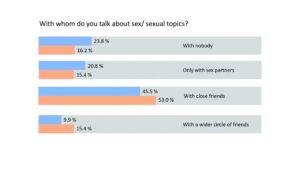Imagine having sex for the first time and neither you nor your partner have the faintest idea how it works. I had this thought suddenly during a conversation with my grandmother about her past. I realised that she neither received ‘the talk’ from her parents nor did she have any kind of sex education at school. Before I knew it, I had just asked her: what was it like on your wedding night? While she hesitated at first (“Can I really say that?”), what followed was one of the most fascinating conversations I ever had with her.
Sex is a taboo throughout the ages
It turns out that growing up on a farm can teach you a surprising amount about reproductive biology – but doesn’t teach you anything about good sex. So, satisfying, fun sex was never part of my grandmother’s life. Which, considering my grandparents were rather poor and did not have access to contraceptives, was maybe just as well. Luckily, a lot has changed since then and I was far better prepared for my first sexual encounters with a good understanding of anatomy, contraception and consent.
While this is a huge progress, I still grew up with a distinct feeling that sex was something taboo, shameful and at least slightly dirty that you could not simply talk about. As a teenager, I would talk to my best friends about everything – except sex or desire. It took me years to find answers to some of the weird teenage questions that burned shamefully within – like “Do other girls masturbate, too?” As unreasonable as it sounds to me now, I remember worrying yet never dared to ask. While you likely didn’t share my particular insecurity, I’m sure that at some point in your life you had to deal
with your variation of “Am I normal?”.
Type less, talk more! The pros of personal conversations
If I had been born just a few years later, I could have googled it on my smartphone and it probably would have helped. Thousands of forum entries, sex information pages and countless ‘Dr Sommer’ articles show that many feel the need to ask questions and discuss. Call me old-school, but I don’t believe that reading articles or writing in forums can ever be as reassuring or engaging as personal conversations.
But talking about sex is still something that most feel uncomfortable with. Asking on the student app Jodel, 24% of men and 16% of women answered that they don’t talk about sex with anyone, with an additional 21% (men) and 15% (women) only talking about it with their sex partners. While this is far from being a representative survey, it gives us a rough idea that sex is a pretty taboo topic in our society.
“So what?”, you could ask. After all, sex is a private affair, why talk about it with anyone not directly involved? I thought the same for a long time. I would try my best to communicate openly with my partner, and I shared a few thoughts with my closest friends, but nothing more. I was happy with that arrangement. But with every open conversation I was having, I realised their benefits. Reducing the awkwardness around the topic by talking freely helped me to find the right words, to be more relaxed and also to have better conversations with my partner.
In the end, questions around sex arise in almost everyone’s life – no matter how often, with whom, how or whether you have or want to have sex. While nobody has to talk about sex, I firmly believe that everyone should feel like they can open up if they want to. So the next time you feel like you are shyly dancing around the topic, try to be brave and dare to ask, listen and tell. If my grandmother can do it, so can you!

Jodel is a social media app where you can anonymously share short texts or pose survey questions. The app is primarily used by young adults and posts get shown to users within a range of a few kilometres. The question and answers were originally posed in Swiss German with 101 people answering in the “askmen” thread and 117 in the “askladies” thread.
Let’s Talk about You and Me, with an Expert
CHARLOTTE HOFFMANN
is a sex therapist, medical doctor and psychologist. I got her expert opinion on three questions.
Do people talk about sex enough?
We often think that we already talk a lot about sex and are highly exposed to the topic. Unfortunately, we don’t talk enough about the insecurities, awkwardness, and unknowns associated with it. All of them are underestimated highways into intimacy. In general, we should try to get away from conversations aiming to show off. A lot of games like “Never Have I Ever” suggest that we are more mature if we have tried many things. But instead of checking a box and boasting about what you did, you can talk about how things made you feel, whether what happened was what you wanted, or what was confusing for you. These questions help you grow and explore your needs. Less “Who has had anal sex before?“, and more “Why did I decide to do it?”.
What happens when we talk openly about sex?
Talking is valuable, even if the conversations aren’t perfect and we don’t always manage to express our feelings perfectly. Speak your truth, even if your voice shakes! Talking about sex is an invitation to be more precise, to exchange feedback, to address needs and insecurities. If problems are named directly, they can be far easier solved. It’s a misconception that addressing things will make them worse – most times the other person has already noticed something anyway. A lot of people are afraid of saying no and hurting the other. But a no can also be given with a lot of context, like: “I would like you to touch my breasts instead of touching my belly”, or: “I don’t want to have sex right now because my stomach really hurts, but I would love to cuddle with you if you want”. In case someone gives you a no, you can also ask for more context and reassurance.
How can we make conversations about sex less awkward?
Practise and start small. For a sexual encounter, for example, you could think about three concrete things that are important for you to address, or you could try to formulate a wish. For example: “I would love to be kissed on the neck”, “It’s easier for me to reach orgasm if I can keep my feet warm – please don’t take my socks off” or “My last STI screening was in January, what about yours?”.
by Anna Weber

